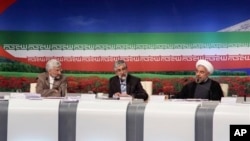Early results from Iran's presidential election have moderate candidate Hassan Rowhani with the lead among the six candidates. He has the support of reformists in Iran.
Rowhani has just over 50 percent of the 12 million votes counted by Saturday morning. Tehran Mayor Bagher Qalibaf in second place is far behind with about 15 percent of the votes.
It is not clear when the final results will be announced. About 50 million Iranians are eligible to vote, and Iranian media have reported turnout estimates of between 75 and 80 percent.
To win, a candidate must get more than 50 percent of the vote. If no one succeeds after the initial vote, a runoff election will take place next Friday.
Officials extended voting by several hours Friday to accommodate what they described as a large turnout in the country's presidential election.
Millions of Iranians voted to choose a successor to President Mahmoud Ahmadinejad, who is constitutionally barred from a third consecutive term.
Analysts say the high interest in the carefully orchestrated campaign may be due to the candidacy of moderate cleric Rowhani. Iran's former nuclear negotiator picked up the endorsements of leading reformists.
Former president Ali Akbar Hashemi Rafsanjani, another reformist leader, who was barred from running by Iran's Guardian Council of clerics and jurists, also had urged his supporters not to boycott the election.
Most other candidates in the the electioni, including current chief nuclear negotiator Saeed Jalili and Tehran Mayor Qalibaf, are considered hardliners who are loyal to the country's supreme leader, Ayatollah Ali Khamenei.
The supreme leader cast his vote in Tehran early Friday, telling U.S. officials who have been critical of the election, "the hell with you."
Khamenei had been calling on Iranians to vote in large numbers.
The election winner will be faced with an economy struggling with high unemployment and inflation, crippled by international sanctions imposed over Iran's disputed nuclear program.
While some candidates favor improved ties with the international community, major policy decisions rest with the supreme leader.
Iran sealed most of its borders, rounded up dissidents and detained some journalists. Most foreign news organizations say their requests for visas to cover the election were unheeded by the government.
One candidate seen as reformist, Mohammad Reza Aref, recently dropped out and then announced his support for Rowhani. Another candidate, Gholam Ali Haddad Adel, dropped out of contention Monday saying he wanted to boost the chances of his fellow conservatives.
Rowhani has just over 50 percent of the 12 million votes counted by Saturday morning. Tehran Mayor Bagher Qalibaf in second place is far behind with about 15 percent of the votes.
It is not clear when the final results will be announced. About 50 million Iranians are eligible to vote, and Iranian media have reported turnout estimates of between 75 and 80 percent.
To win, a candidate must get more than 50 percent of the vote. If no one succeeds after the initial vote, a runoff election will take place next Friday.
Officials extended voting by several hours Friday to accommodate what they described as a large turnout in the country's presidential election.
Millions of Iranians voted to choose a successor to President Mahmoud Ahmadinejad, who is constitutionally barred from a third consecutive term.
Analysts say the high interest in the carefully orchestrated campaign may be due to the candidacy of moderate cleric Rowhani. Iran's former nuclear negotiator picked up the endorsements of leading reformists.
Former president Ali Akbar Hashemi Rafsanjani, another reformist leader, who was barred from running by Iran's Guardian Council of clerics and jurists, also had urged his supporters not to boycott the election.
Most other candidates in the the electioni, including current chief nuclear negotiator Saeed Jalili and Tehran Mayor Qalibaf, are considered hardliners who are loyal to the country's supreme leader, Ayatollah Ali Khamenei.
The supreme leader cast his vote in Tehran early Friday, telling U.S. officials who have been critical of the election, "the hell with you."
Khamenei had been calling on Iranians to vote in large numbers.
The election winner will be faced with an economy struggling with high unemployment and inflation, crippled by international sanctions imposed over Iran's disputed nuclear program.
While some candidates favor improved ties with the international community, major policy decisions rest with the supreme leader.
Iran sealed most of its borders, rounded up dissidents and detained some journalists. Most foreign news organizations say their requests for visas to cover the election were unheeded by the government.
One candidate seen as reformist, Mohammad Reza Aref, recently dropped out and then announced his support for Rowhani. Another candidate, Gholam Ali Haddad Adel, dropped out of contention Monday saying he wanted to boost the chances of his fellow conservatives.





